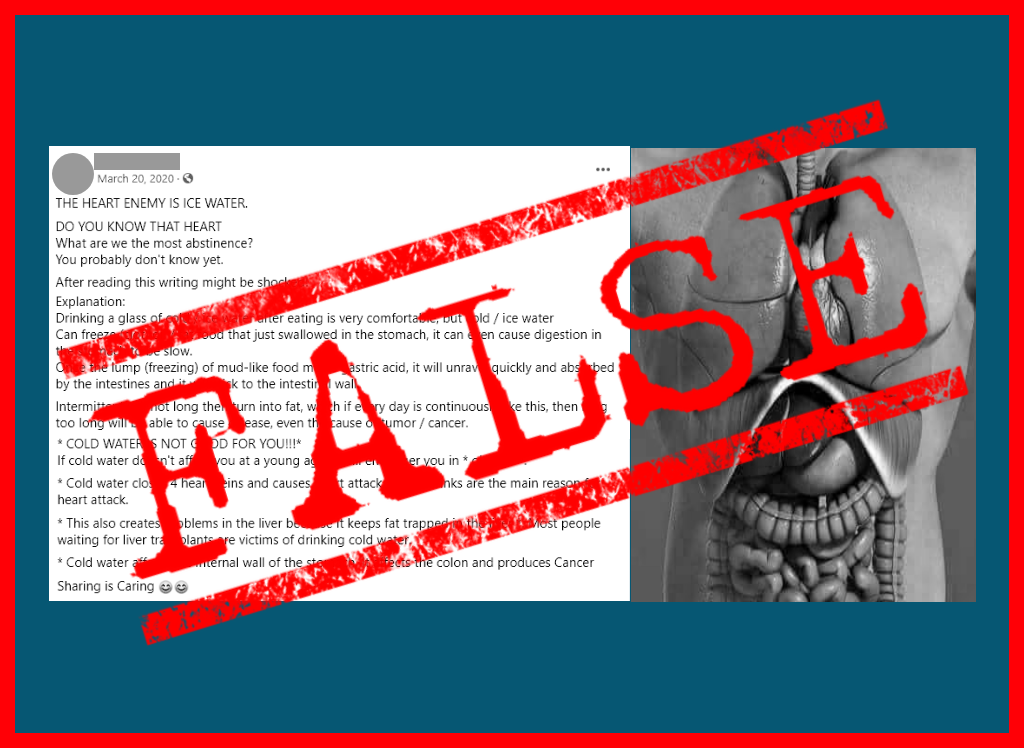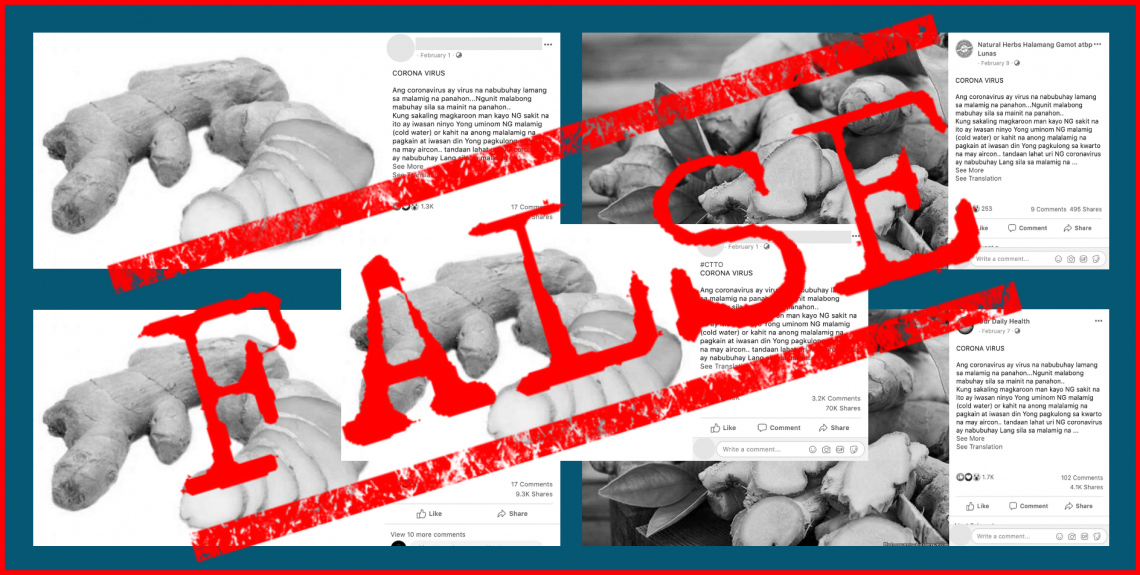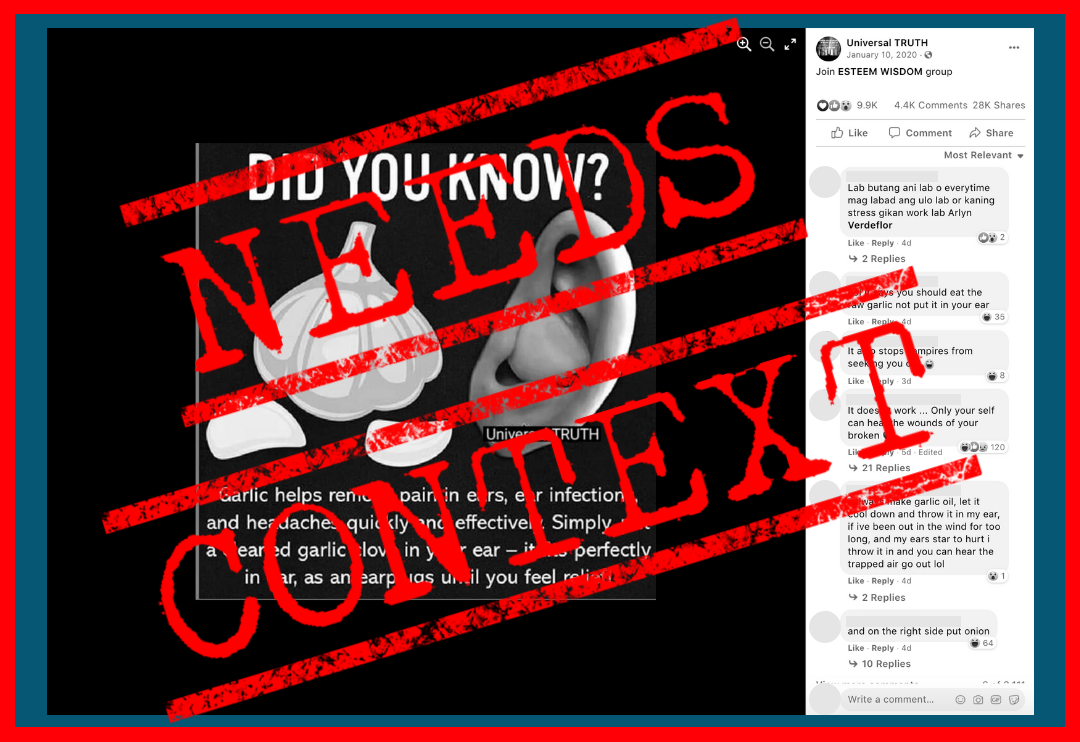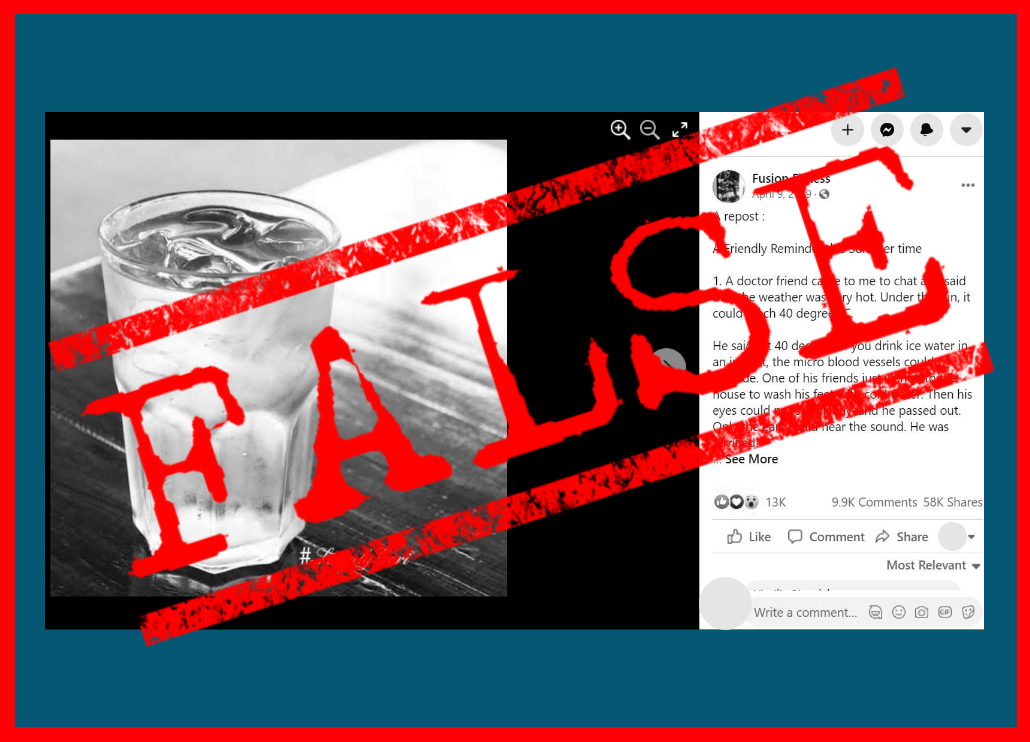A 15-month-old Facebook post carrying incorrect warnings about drinking cold water and misconceptions about the health benefits of warm water continues to gain traction among netizens.
The inaccurate post enumerates several claims that drinking cold water can cause heart attack, cancer, and digestive issues, while citing the alleged health benefits of drinking warm water, such as curing cancer, heart diseases, stomach problems, and other illnesses.
Experts told VERA Files Fact Check that claims about cold water causing health problems are scientifically unproven, and that drinking warm water for a certain time period is not a cure for serious diseases and ailments.

Here are the five myths in this Facebook post as fact-checked and debunked by experts:
1. Drinking cold water does not close four heart veins or cause heart attacks
Drinking cold water “cannot, in any way, lead to a heart attack or any type of heart disease”, according to VERA Files Fact Check’s June 18 email interview with internist-cardiologist Ailen Albaña-Tamargo.
Heart attacks are mainly caused by coronary heart disease and not by drinking cold water, the United States (U.S.) Centers for Disease Control and Prevention (CDC) stated.
Coronary heart disease is a condition where the heart’s main arteries, not the veins, get clogged with a buildup of cholesterol, the National Health Service of the United Kingdom explained.
Vasoconstriction, or the narrowing of blood vessels, cannot be induced by drinking cold water. It can only happen when a person is immersed in a pool of cold water, said Albaña-Tamargo.
2. Cold water causing cancer is untrue
Drinking cold water is not listed in the U.S. National Cancer Institute’s risk factors for cancer, nor is it classified as a beverage that can cause cancer.
In a 2021 fact check article of the Australian Associated Press, Cancer Council Australia’s physical activity and nutrition committee chair Clare Hughes said there is no evidence drinking cold water increases the risk of cancer, including stomach and intestinal cancer.
Drinking water is neither included in the CDC’s list of risk factors for colorectal (large intestine) cancer, nor listed in the American Cancer Society’s article about risk factors for stomach cancer.
3. Warm water not a cure for cancer, heart disease, health issues
Regardless of temperature, drinking water to cure all forms of cancer does not have any scientific basis at all, Ann Meredith Garcia-Trinidad, head of medical oncology at the Dagupan Doctors Villaflor Memorial Hospital, said.
“Cancer is such a complex, multifactorial disease that involves our genes and our environment, and if the cure were just lying around in the form of warm water, we would have eradicated cancer by now,” said Garcia-Trinidad in a June 16 email interview with VERA Files Fact Check.
Meanwhile, drinking warm water does not treat heart disease in 30 days. The erroneous medical advice is “not proven by research” as an effective health recommendation, said Albaña-Tamargo.
The American Heart Association lists down several lifestyle changes to prevent heart attacks such as controlling one’s blood cholesterol, being physically active, maintaining a healthy weight, reducing stress, and limiting alcohol and cigarette smoking. Drinking warm water is not included in the list.
And most of the health claims about warm water therapy curing different types of health issues have been exaggerated, said Kareena Abungin, Nutrition Officer II of the National Nutrition Council’s Nutrition Information and Education Division.
“There are not enough studies to prove that drinking water… will address health issues such as stomach problems, bad appetite, diabetes, cancer, heart disease, and blockage of blood vessels,” Abungin told VERA Files Fact Check.
4. Drinking cold water does not slow down digestion or trap fat in the intestines
Drinking cold water does not slow down digestion by “freezing” food into a mud-like lump.
“Our stomach acids already break down almost everything that we consume before these even reach the intestine. Hence, this claim is physiologically incorrect,” said Garcia-Trinidad.
It does not freeze fat in the food that we eat, as falsely claimed in the post.
“Cold water may slightly lower gastrointestinal temperature, but it will not cause ingested fats to solidify in the digestive tract, particularly in the intestinal wall,” said Abungin.
Both Abungin and Garcia-Trinidad said that cold water will eventually equalize with the body’s core temperature, hence it’s impossible to freeze fat in the stomach.
During digestion, fats are broken down in the small intestine using a fluid produced and secreted by the liver called bile. Small lipid (fat) molecules are absorbed directly into the bloodstream, while larger lipids combine with bile and are diffused into cells, Abungin explained.
Drinking cold water does not make it difficult to break down fat, the NNC nutrition officer added. Bile is made from around 95% of water, so hydration helps in its production.
Proper hydration, regardless of water temperature, aids the digestive system by maintaining normal bowel movement and preventing constipation.
5. Drinking cold water does not cause nonalcoholic fatty liver
Cold water does not trap fat molecules in the liver. It is not listed as a risk factor for developing nonalcoholic fatty liver disease.
Risk factors of fat build-up in the liver include obesity, type II diabetes, high blood pressure, and high cholesterol levels, according to the Cleveland Clinic and the Australian Better Health Channel.
This myth on drinking cold water causing a fatty liver most likely came from an 11th century book, The Canon of Medicine, written by Iranian physician Avicenna.
This health misinformation, first posted by a netizen in March 2020 has garnered 30,000 reactions, 300 comments, and 122,000 shares as of posting. Filipino netizens are still sharing the post as true, even though it was already debunked in April.
(See also: VERA FILES FACT CHECK: Viral advisory against drinking cold water amid heat NOT TRUE)
ERRATUM: An earlier version of this story incorrectly stated that bile is a digestive enzyme in the liver. We have corrected this to say that bile is a fluid produced and secreted by the liver. We apologize for the mistake.
(Editor’s Note: VERA Files has partnered with Facebook to fight the spread of disinformation. Find out more about this partnership and our methodology.)





